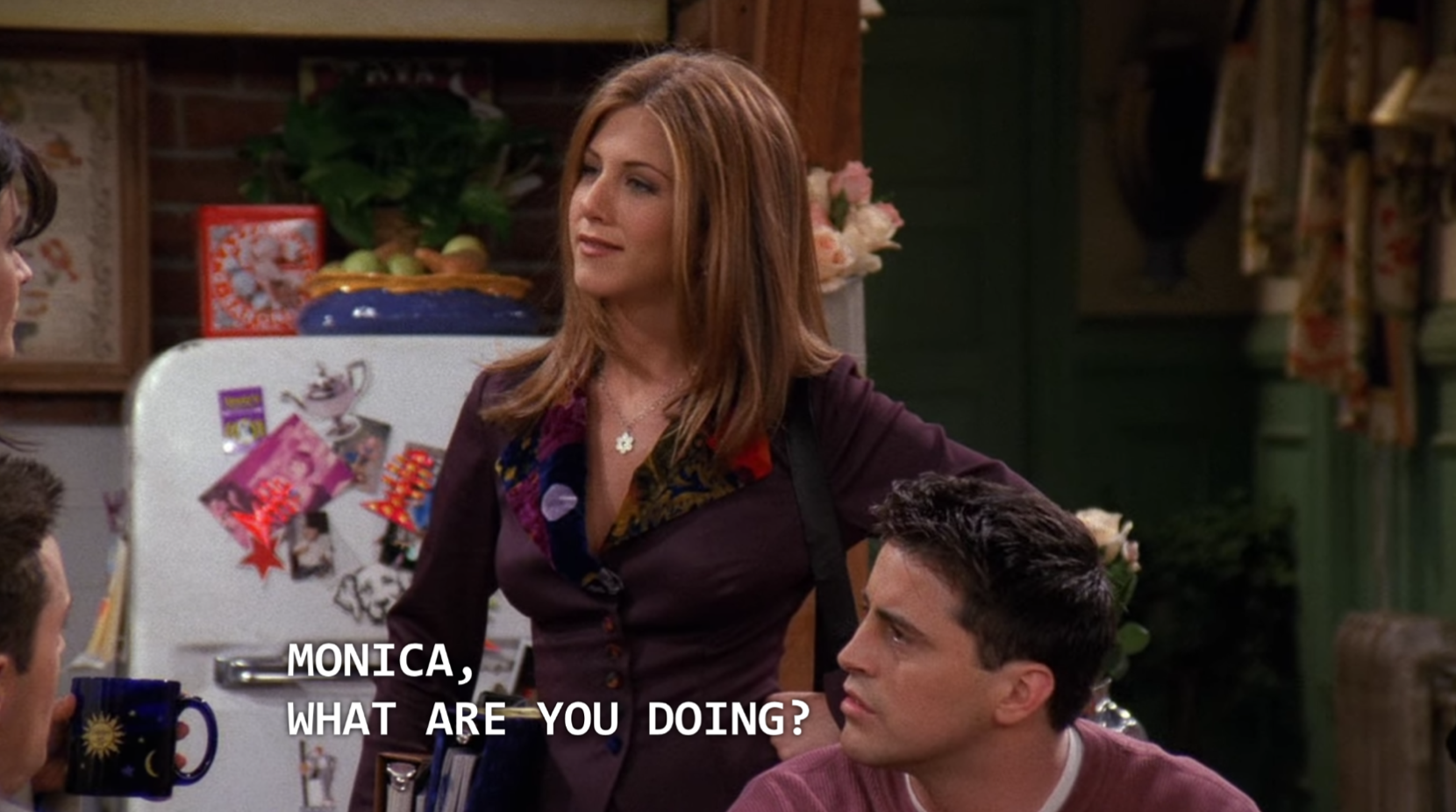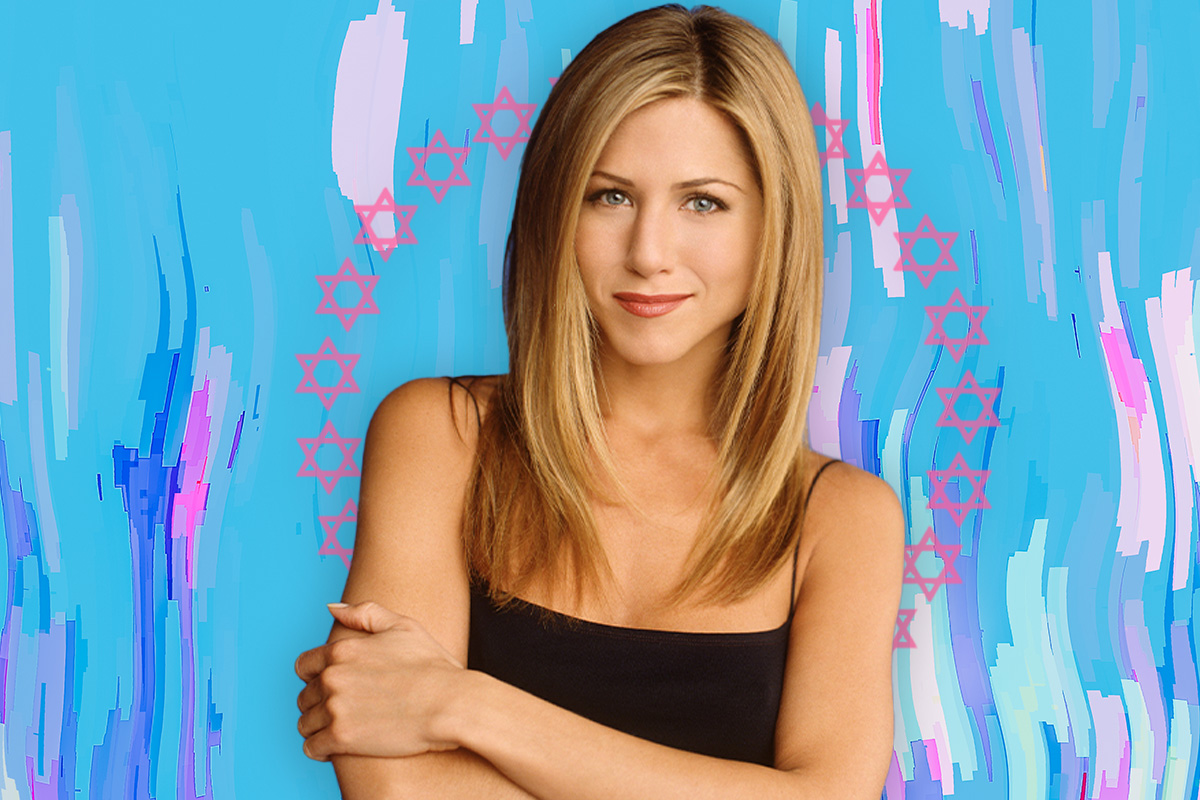It’s a question that has been covered by multiple writers across time and space, asked again and again for decades, the true answer held frustratingly out of reach of the general public who anxiously wait for the answer:
Is Rachel Green Jewish?
Let’s lay the groundwork. Rachel fulfills several classic (not great) tropes often assigned to Jewish women: she gets a nose job as a teenager; she’s a spoiled girl with direct access to Daddy’s credit card and buys whatever she wants; she’s engaged to a wealthy orthodontist whose last name is Finkle (very Jewish) in the pilot episode and Farber (also Jewish) for the rest of the series. She grew up in the same neighborhood on Long Island as Monica and Ross, Established Jews™. She refers to her “bubbe” in exactly one episode, “The One With Rachel’s Phone Number.” She also seemingly wears a Magen David necklace in “The One Where Monica and Richard are Just Friends” (but it also could very well just be a flower).

Furthermore, in “The One With the Girl from Poughkeepsie,” Phoebe’s original holiday song draft contains the lyric “spin the dreidel, Rachel.” Upon hearing this, Rachel’s only problem with this lyric is that “dreidel” and “Rachel” do not rhyme. However, in a later song draft, when Phoebe wishes Chandler a “Happy Hanukkah,” his response is, “I’m not Jewish.” Thus, one can draw the conclusion that Rachel is in fact Jewish, as her only qualm with the song is the rhyming structure, and not her being mentioned in proximity to the Jewish holiday.
If that analysis isn’t ironclad enough for you, creator Marta Kaufman confirmed that Rachel was Jewish in an interview with The Jewish Telegraph, and former Friends writer Jeff Greenstein confirmed it on Twitter in 2014.
So there. Easy. Rachel is Jewish. But despite being on the air for 10 years, despite churning out 236 episodes, Rachel Green’s Jewishness is never once stated aloud.
So I guess our question shouldn’t be “is Rachel Jewish?” but rather “why wasn’t Rachel allowed to be Jewish?”
Jewish women have overcome the Madonna/Whore archetype; instead, they are sorted into the Neurotic Obsessive Women/Over-Involved Mother paradigm. (Sure, it’s a wordy, awkward name, but I guess it reflects the women who fall into these categories.) A shrill, Jewish woman has to be one of these things, but unlike other archetype models, she can sometimes be both at once. “Friends” encapsulates its Neurotic Obsessive Jewish Woman in the character of Monica, whose obsession with rule-keeping and cleaning is clearly a character flaw that’s played for laughs. On the flip side, Judy Gellar’s obvious favoritism of Ross falls under a subcategory of Over-Involved Jewish Mother: the My-Son-Can-Do-No-Wrong Jewish mother.
But Rachel falls into neither of these categories, and thus is never overtly Jewish. Instead, Rachel is the beautiful, sometimes-blonde woman involved in the show’s central romance: She is the Shiksa Goddess to Ross’s Nice Jewish Boy. By invoking the Shiksa Goddess trope, we can recognize two main issues that stem from it. First, the idea that Jewish women are so rarely the romantic leads, but always relegated to comedic side characters. While yes, Monica is a main character with her own love story, it is impossible to deny that the central love story of Friends is that of Ross and Rachel, an epic tale that takes 10 years to unfold. More than that, when you look at the jokes constructed around both Monica and Rachel, Monica (and her Neurotic Woman tropes) seems to be the butt of the joke much more often than Rachel; Rachel is a character who has funny things happen to her, where Monica is much more often the character who is the funny thing. She is allowed to be silly and goofy in a way that Rachel is not, and therein lies the difference.
The second fallout of the Shiksa Goddess trope is the notion that hot, unattainable characters are not allowed to be Jewish. Don’t get me wrong, season one through four Monica is literally my perfect woman, but she is not the confident hottie that Rachel is. Rachel is the refined, sexy woman who has to teach Monica how to seduce guys, who has to ask out Jean-Claude Van Damme because Monica isn’t confident enough. It very often feels like their dynamic is defined by this power disparity.
(Side note: I could spend a thousand years talking about the Weak Jewish Intellectual Jew and how Ross is semi-responsible for its revival in various media, but I also refuse to think about Ross Gellar for any longer than absolutely necessary.)
But let’s get back to my original analysis: Rachel still embodies several problematic Jewish tropes. It is undeniable that Rachel’s shallowness, nose job and familial wealth are all indicators of her being a Jewish American Princess. But by divorcing these tropes from a defined Jewishness, the writers absolve themselves of negatively stereotyping Jewish people. That is to say, by not overtly calling her Jewish, Rachel’s tropes just point to her being — for lack of better words — a selfish, kind of shitty person. Her selfishness and vapidity become hurdles for her to overcome with the help of her friends. Thus, the only displays of Rachel’s identity are all seen as character flaws to overcome (unlike Monica’s flaws, which are treated as accepted parts of her identity) and Rachel’s Jewishness — whether confirmed or not — is still somehow the butt of the joke.
So there you have it, I guess. I don’t think the creators of “Friends” intended to contribute to various levels of problematic-ness, especially when it comes to Jews. I do, however, think that Hollywood’s strict rules influence creators in ways we don’t even realize. Was Marta Kaufman even aware that Rachel never talked about her Judaism in the way Monica and Ross do? Was it purposeful, or did she just happen to overlook it?
In a sense, Rachel’s Jewishness inspires me. My Jewishness isn’t something to gloss over, an unspoken thing that people have to piece together through context clues. And as I continue to create Jewish characters in my own writing, I want to ensure that their Jewishness is purposeful and relevant, not something forgotten about or vague.
I’m sure others will continue to write about Rachel’s Jewish status, and by doing so we can stop asking if she’s Jewish and start just assuming it instead. Because solidifying Rachel Green in the pantheon of Great Jewish TV Characters gives me the hope that one day I, too, can be as hot as Jennifer Aniston.



